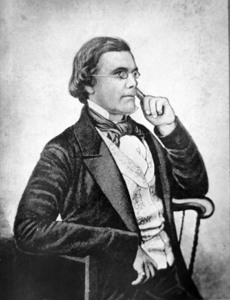 This Goodly Land
This Goodly Land
A. B. Meek (July 17, 1814–November 30, 1865)

Other Names Used
- Alexander Beaufort Meek: full name
Alabama Connections
- Tuscaloosa, Tuscaloosa County: childhood residence, education, adult residence
- Mobile, Mobile County: adult residence
- Montgomery, Montgomery County: served in state legislature
Selected Works
- Meek, A. B. The Red Eagle: A Poem of the South. New York: D. Appleton & Co., 1855. Rpt. Montgomery: Paragon Press, 1914. An online version of The Red Eagle is available from Google Book Search.
- Meek, A. B. Romantic Passages in Southwestern History: Including Orations, Sketches, and Essays. New York, Mobile: S. H. Goetzel & Co., 1857. Rpt. Spartenburg, S.C.: Reprint Co., 1975. An online version of Romantic Passages in Southwestern History is available from Making of America.
- Meek, A. B. Songs and Poems of the South. Mobile: S. H. Goetzel & Co., 1857. An online version of Songs and Poems of the South is available from Making of America.
Biographical Information
A. B. Meek was born in Columbia, S.C., the oldest of ten children. His family moved to Tuscaloosa, Ala., when he was about five. As a boy, he was a voracious reader of newspapers, especially literary ones, smuggling them into his classes folded up to a size that would fit inside a schoolbook. He began writing poetry in his teens. Meek attended the University of Georgia but transferred to the University of Alabama when it opened in 1831, graduating with an AB in 1833 and earning an MA in 1836. Meek was admitted to the bar at Tuscaloosa in 1835. In early 1836, he volunteered for military service in the Seminole War in Florida. Meek was a Jacksonian Democrat and was involved in politics. He was appointed several times to state legal offices, mostly to fill out unexpired terms. He also served as law clerk for former Tuscaloosan Seth Barton, who was solicitor of the United States Treasury under President James K. Polk. In 1846, Meek was appointed Federal Attorney for the Southern District of Alabama in Mobile, which became his residence for nearly twenty years. Meek was elected twice to the state legislature from Mobile. In his first term, he sponsored the bill to establish free public schools in Alabama. In his second term, he was elected Speaker of the House.
In 1835, Meek began editing and publishing the Tuscaloosa-based Democratic newspaper, the Flag of the Union. In 1839, Meek became the founder and editor of The Southron, a short-lived literary monthly in which he laid out his theories for Southern literature. During this period, he also published poems in several Southern literary newspapers. From 1851 to 1853, Meek was an associate of Thaddeus Sanford, editor of the Mobile Register, which published many of his poems. He was also a popular orator, speaking on topics related to Southwestern history. In 1855, Meek published his book-length poem, The Red Eagle, about William Weatherford, Andrew Jackson, and the Creek War of 1813. In 1857, he published two more books, a collection of poems and lyrics about the South and a prose work on Southwestern history, which included several of his orations on the subject. In 1863, Meek moved to Columbus, Miss., to live with the family of his younger brother who was serving in the military. He died there two years later of heart failure. His lifelong project, a history of Alabama, was never published.
Interests and Themes
A. B. Meek wanted to create a unique Southern literature in the tradition of Romanticism. He believed that Southern writing should feature the beautiful natural scenery, the original Native American inhabitants of the land, and the history of the region's discovery, exploration, and settlement.
For More Information
Please check your local library for these materials. If items are not available locally, your librarian can help you borrow them through the InterLibrary Loan program. Your librarian can also help you find other information about this author.
There may be more information available through the databases in the Alabama Virtual Library. If you are an Alabama citizen, AVL can be used at your public library or school library media center. You can also get a username and password from your librarian to use AVL at home.
Reference Books
- Nixon, Herman Clarence. Alexander Beaufort Meek: Poet, Orator, Journalist, Historian, Statesman. Auburn: Alabama Polytechnic Institute, 1910.
Reference Articles
- Beidler, Philip D. "A. B. Meek's Great American Epic Poem of 1855, or, The Curious Career of The Red Eagle". Mississippi Quarterly 51.2. (1998): 275-290.
- Figh, Margaret Gillis. "Alexander Beaufort Meek, Pioneer Man of Letters". Alabama Historical Quarterly 2. (1940): 127-151.
- Ross, Charles Hunter. "Alexander Beaufort Meek". Sewanee Review 4. (1896): 411-427.
Reference Book Chapters and Encyclopedia Entries
- Williams, Benjamin Buford. "Alexander Beaufort Meek, Poet and Historian"; A Literary History of Alabama: The Nineteenth Century. Rutherford, N.J.: Fairleigh Dickinson University Press, . 39-57.
Reference Web Sites
- Williams, Benjamin Buford. "Alexander B. Meek". The Encyclopedia of Alabama. 2008. Alabama Humanities Foundation and Auburn University. http://www.encyclopediaofalabama.org/face/Article.jsp?id=h-1127.
Location of Papers
- Alabama Department of Archives and History
- Duke University
- University of Alabama
Photo courtesy of the Alabama Department of Archives and History.
Last updated on May 30, 2008.